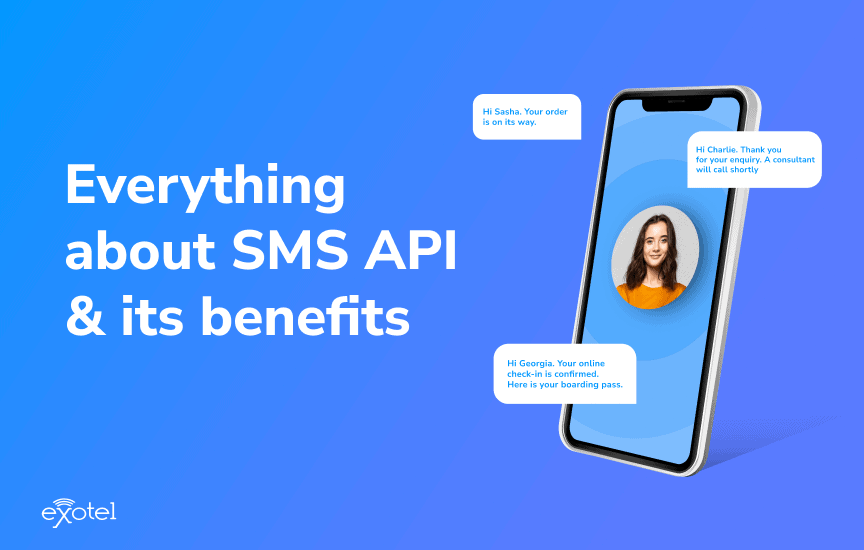The first SMS was sent on 3rd December 1992. In just thirty years, technology has become ubiquitous. Indian businesses are sending over a billion messages a day. Order updates, product promotions, OTP and authentication, security alerts, customer onboarding, reminders, etc., are just a few ways businesses use SMSes.
To send, track and manage SMSes at this scale, businesses need a robust technological foundation. Enter SMS API.
What is SMS API?
Have you ever integrated your Instagram or Facebook account into your blogging website? If yes, then you’ve already used an API.
An API or Application Programming Interface is a software that allows two different applications to interact with one other without any human intervention. For example, an SMS API is an HTTP-based REST API that enables you to send SMSes using internal applications or software.
The API allows businesses to integrate the SMS platform with any enterprise application such as the CRM or marketing automation tool to send customized text messages 24×7 programmatically.
How does an SMS API work?
Simply put, the SMS API triggers messages based on pre-defined conditions. Once integrated with an SMS API, you can send an HTTP POST request, which will then automatically trigger SMS campaigns to the numbers of your choice.
For instance, when a customer registers on a website with a mobile number, an OTP is sent for verification. The SMS API bridges the gap between the trigger (registration) and the response (OTP) by operating between them.
Why should businesses use SMS APIs?
Today, businesses send thousands, if not millions, of SMSes each day. Some use cases are suitable for pre-scheduling. For instance, promotional messages are sent in bulk at a pre-determined time to a specific audience. But most messages are sent on individual triggers. For instance, an OTP verification or a delivery update. These are customized SMSes sent to individual recipients in response to real-time triggers. To manage this at scale, an SMS API is the best way.
#1 Scale
SMS APIs enable businesses to send thousands of SMSes each minute without any manual intervention. This means that as your business grows, your SMS capacity can dynamically grow without capital investment in technology or human resources.
#2 Efficiency
By enabling businesses to send messages using code, SMS APIs automate a significant part of the communication process. For instance, marketing teams regularly transfer customer data from internal customer relationship management (CRM) systems to the SMS provider’s software to send bulk SMSes.
An SMS API can automate this process and allow you to segment your audience and send specific messages to your target customers efficiently.
#3 Deliverability
Connecting to the SMS gateway, an API allows businesses to send thousands of messages with unparalleled reliability.
For instance, at Exotel, we offer 99.94% uptime, including operator uptimes, and a 95% delivery rate, and our SMS OTPs are delivered within 3-8 seconds on average. Our SMS API also comes with built-in redundancies that optimize delivery rates significantly.
See how Go-Jek improved SMS delivery rates to 92% with Exotel.
#4 Security
An SMS API enables better data and communication security for business SMSes.
Exotel uses enterprise-grade AWS data centers and the TLS 1.2 encryption standards to protect data in transit. We also follow the best practices to keep your data secure.
You can read more about it here.
#5 Visibility
SMS API automatically tracks many metrics such as delivery rate, open rate, latency, failures, reasons, etc. For example, when an SMS is sent, you will not only know whether the message was delivered but know the exact time it was delivered to the customer.
This data will let you maintain a consistent audit trail, giving you the power to take appropriate action, such as trying an alternate channel, in case of non-delivery of messages.
#6 Ease of use
SMS APIs are extremely easy to set up. You don’t need a team of developers to integrate an SMS API with your current tech stack.
Typically, using an API involves writing a few lines of simple code. In fact, Exotel’s APIs are straightforward to understand and use. Everything you need to send SMSes using our API is well documented, down to the last detail.
How to get started with an SMS API?
Whether you’re new to adopting an SMS API or are shifting from an existing provider, choosing the right service can seem overwhelming. But we’ve got you covered. Exotel’s SMS API is easy to integrate, well-documented, reliable, and secure.
Sign up for a free trial today to see what Exotel’s SMS API can do for your business. Or book a demo with us to know more.




 +91-8088919888
+91-8088919888 +61-2-8073-0559
+61-2-8073-0559 +62-215-098-4960
+62-215-098-4960 +60-3-2771-2799
+60-3-2771-2799 +65-6951-5460
+65-6951-5460